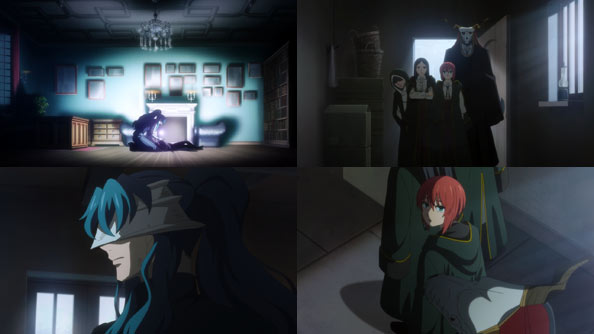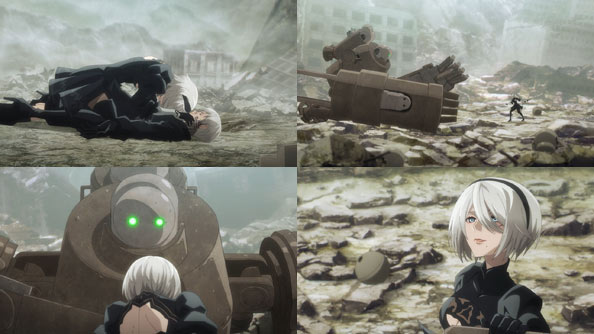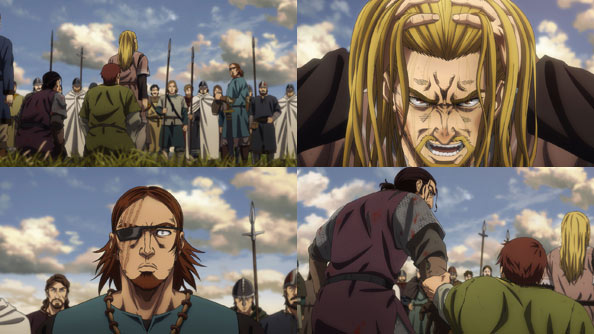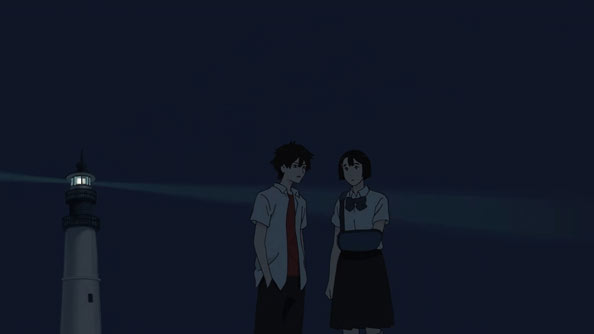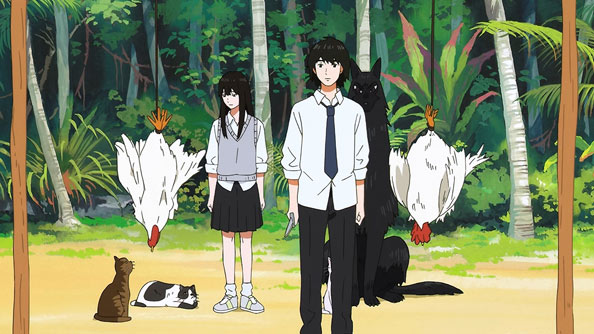Zoe intercepts the she-werewolf and freezes her with his Medusa eyes, but quickly grows fatigued. When the wolf starts to struggle, another layer of Zoe’s medusa side surfaces, one he didn’t think was necessary. However, in this form he inadvertently destroys the curse placed on the werewolf by Lizbeth, and all of her memories of her family come rushing back. She thanks Zoe, referring to him as her “god”, then takes her leave.
We then learn that Alcyone was carrying Philomela’s soul within her body for an undisclosed amount of time and with her consent (as much as Philomela can consent to anything). But even when she produces the soul and places it back into Philomela’s body, she continues to deteriorate.
Between Zoe freeing the werewolf and Morrigan handling all of the Sargeant forces, Chise, Elias, Lucy and Isaac are able to enter the mansion without any issues. Alcyone meets them and asks them if they’re there for the book or for Philomela’s sake.
Isaac assures them it’s the latter, so she lets the three kids go, but insists Elias stay behind since he’s not thinking about Philomela. No doubt he’s thinking about Chise … and what he’s going to do to appease Morrigan when this is all over.

But there’s still quite a bit to do. Upon entering the office Philomela’s root-like tendrils attack them, but Chise’s amulets hold. When the tendrils start to slip under Isaac’s hood, lending us the first look at his eyes, he slashes at them and freaks out.
Lucy sees a framed spider on the wall, kicks Philomela, grabs her by the tendrils and demands an explanation. All Philomela can do is apologize. Clearly both Isaac and Lucy are being sidetracked by their own baggage, so Chise steps in, and then dives into Philomela’s dreams.
There, Philomela is a little kid like in the OP; unlike the OP, Chise is also a kid. She guides Philomela around her dream, which takes the general form of a school, and helps her collect lost “pieces” of herself, which manifest as various memories, both good and bad.
This includes the wooden puzzle with which she once played with Rian, the dungeon where her grandmother imprisoned her when she failed to measure up to her, and the photo of her as a baby with her parents’ faces blacked out with marker. Philomela also gets glimpses of Chise’s psyche, which Chise says is a matter of the two of them getting “mixed up” in this non-corporeal place.

While Philomela continues to collect her pieces and witnesses some of Chise’s, she starts to form a picture of Chise as someone perhaps similar to her. Neither of them knew their parents faces, and both of them faced long stretches of cold, barren, lonely darkness.
But all of that despair is washed away once they reach the school rooftop, replaced by a gorgeous sunset. Now that Philomela has all of her pieces back, it’s on her to decide what to do, and what she wants others to do for her.
When she asks Chise why she’s helping someone who tried to kill her, Chise admits she’s trying to save her past self, whose eyes were identical to Philomela’s. The two go on to find a little Isaac crying on the top of a mountain of debris, and it’s Philomela who comforts him by placing her hand on his head.
While they’re all in younger forms, all three remember who they are and who they are to each other. All that’s left is to find Lucy, who is in a library full of cobwebs. Like Isaac, she had been crying alone until the others came, but was eager to find them so she could stop crying and do something; move forward.
She asks nothing less of Philomela: stop whining and either run away, do something else, or say something, anything, for herself. Alas, when Philomela drops her flashlight and it starts projecting a recording of the events that led to Philomela being present for the assassination of Lucy’s family, well, let’s just say it kills the redemptive mood.

Lucy grabs her and demands to know why she killed her family, but Philomela doesn’t know. She never had the right to know, and at the time Lucy’s family was killed, there was nothing she could have done to stop it. But while her past self was powerless, her present self isn’t.
She’s allowed to speak now. Chise tells her she can’t remind silent if she wants help; she has to shout out for it; that’s just the way of the world they live in. Philomela finally does manage to utter what she wants, which is for Chise and the others to help her.
Unfortunately, just as she says “help me”, her dark version appears and swallows her up in her tendrils. When Chise reaches out for her, kid Philomela turns into a cloud of flower petals and is scattered into the darkness. Just when it felt like genuine progress was being made and we were close to a breakthrough, we may be back to square one. As such, this episode ends on a bit of a downer. Hopefully, all hope for Philomela isn’t lost.


